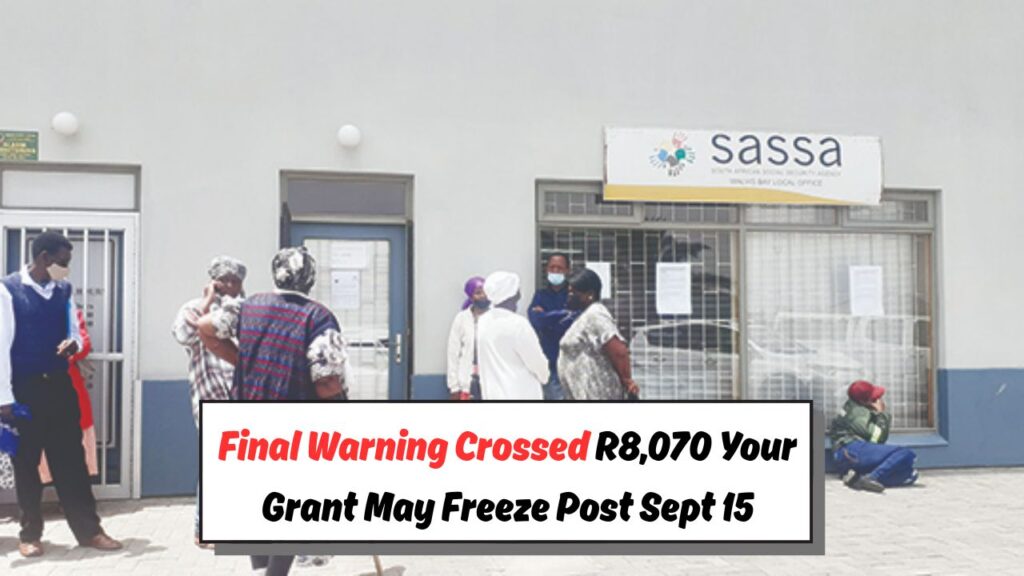Urgent Alert: SASSA Grants Ending for Higher Income Brackets: In a significant policy shift, the South African Social Security Agency (SASSA) has announced that grants for individuals with a monthly income exceeding R8,070 will cease by the end of September. This move aims to streamline the allocation of financial assistance to those most in need. SASSA’s decision is part of an ongoing effort to optimize the distribution of social grants amidst ongoing economic challenges in South Africa. With the nation grappling with economic recovery, this change is intended to ensure that social aid reaches the most vulnerable populations.

Understanding the SASSA Grant Policy Change
The recent announcement by SASSA to discontinue grants for individuals earning above R8,070 per month marks a pivotal change in the agency’s approach to social welfare. This decision emerges from a comprehensive review aimed at ensuring that the limited resources are directed towards those who need them most. The South African government has been under pressure to manage its social welfare budget effectively, especially in light of recent economic downturns and growing fiscal deficits. By setting an income threshold, SASSA intends to ensure that the funds are allocated to South Africans facing genuine financial hardships. This policy update reflects a broader governmental strategy to address economic inequalities and support the nation’s most vulnerable citizens. While this change may seem abrupt, it is a calculated move to preserve the sustainability of the social grant system. Affected individuals are encouraged to seek alternative financial planning strategies and explore other governmental assistance programs that may be available to them.
Impact on Beneficiaries Above R8,070 Income Level
The cessation of SASSA grants for individuals earning more than R8,070 monthly will significantly impact a considerable segment of the population. For many, these grants have been a crucial financial lifeline, particularly in the face of rising living costs. The removal of this support requires affected individuals to reassess their financial situations and seek new avenues for income. This policy change not only affects the beneficiaries but also poses a challenge to communities relying on these funds. Many recipients use their grants to support not just their immediate families but extended family members and even community projects. Therefore, the cessation of these funds could have a ripple effect, potentially leading to increased financial strain within communities. It is crucial for local support networks and community organizations to step up and provide additional assistance where possible. Meanwhile, SASSA has indicated that they will be providing guidance and support to help those affected transition during this period.
Alternative Support Options for Affected Individuals
For those affected by the end of SASSA grants, exploring alternative support options is essential. The South African government offers several programs that might be beneficial for individuals transitioning from grant dependency. Employment and skills development initiatives are available through various governmental and non-profit organizations, providing opportunities to gain new skills and improve employability. Additionally, financial literacy and planning workshops can help individuals better manage their resources and plan for future financial stability. Community-based support systems, including local NGOs and charity organizations, are also critical in filling the gaps left by government assistance. These entities often provide food, clothing, and other essential services to those in need. It is advisable for affected individuals to actively engage with these community resources to gain the necessary support during this transitional phase.
Future of Social Assistance Programs in South Africa
The future of social assistance programs in South Africa is at a crossroads, with the government seeking to balance fiscal responsibility with the welfare needs of its citizens. The decision to discontinue SASSA grants for those earning above R8,070 is indicative of a broader strategy to reform social assistance, ensuring that funds are effectively reaching those in dire need. The government is likely to continue reassessing and restructuring social assistance policies to enhance their impact and sustainability. As South Africa navigates its economic recovery, the emphasis will be on creating a more inclusive economy that reduces dependency on social grants. This may involve increased investment in job creation, education, and healthcare, aimed at empowering citizens to achieve financial independence. The government’s commitment to social welfare remains strong, but the methods and strategies may evolve to reflect changing economic realities and priorities. The ongoing dialogue between policymakers, economists, and community leaders will be crucial in shaping the future landscape of social assistance in the country.




